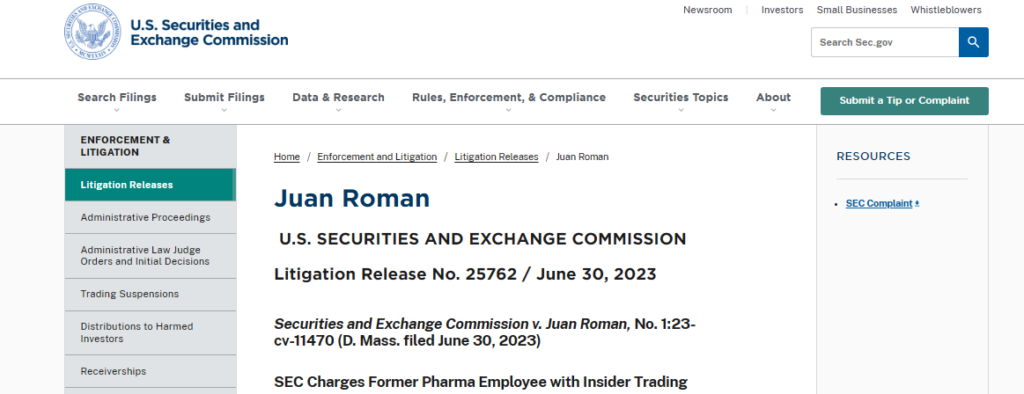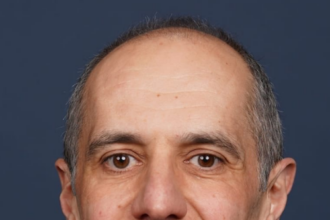Boston, MA — In a significant enforcement action, the Securities and Exchange Commission (SEC) has charged Juan Roman, a former pharmaceutical executive, with insider trading. Roman, who previously served as the Senior Director of Market Access at Acceleron Pharma Inc., has been accused of trading securities based on confidential information about the company’s drug development milestones, resulting in substantial illegal profits.

Juan Roman- The Allegations
The SEC’s complaint, filed in federal court in Boston, details how Roman allegedly leveraged his position to engage in insider trading on two occasions in 2019 and 2020. Acceleron Pharma, a Massachusetts-based biopharmaceutical company, was actively developing medications with the potential to impact their stock value significantly once publicly disclosed.
Juan Roman- First Incident: December 6, 2019
The complaint outlines that on December 6, 2019, Roman traded Acceleron stock and options during a securities trading blackout window. This was just before the company announced positive news regarding its application to the FDA for approval to market and sell Reblozyl, an anemia drug, for a specific use. Roman’s trades, made with the advantage of nonpublic information, allegedly netted him a profit of $1,637.
Juan Roman- Second Incident: January 23-24, 2020
Just a month later, Roman is accused of another round of illicit trading. On January 23 and 24, 2020, he traded Acceleron options during another blackout period, ahead of the release of favorable clinical trial results for Sotatercept, a drug in development for treating pulmonary arterial hypertension. The SEC claims these trades earned Roman $96,115 in profits.
Juan Roman- SEC’s Stance
The SEC has been clear about its commitment to maintaining the integrity of the financial markets. Joseph G. Sansone, Chief of the SEC’s Market Abuse Unit, emphasized that the charges against Roman reflect the agency’s ongoing efforts to prevent and penalize insider trading. “Trading on material nonpublic information is not just unfair; it’s illegal. The SEC will continue to pursue those who undermine the principles of market integrity,” Sansone stated.

The U.S. Securities and Exchange Commission is an independent federal agency responsible for enforcing the laws against market manipulation. The SEC strives to protect investors, maintain fair, orderly, and efficient markets, and facilitate capital formation.
Juan Roman- Resolution and Penalty
To resolve the charges, Roman has agreed to a settlement, which includes paying more than $200,000 in penalties. This settlement reflects the SEC’s determination to impose meaningful consequences on individuals who exploit their access to sensitive information for personal gain.
Juan Roman- Implications for the Industry
This case serves as a stark reminder to professionals in the pharmaceutical and biopharmaceutical sectors about the importance of adhering to securities laws and ethical standards. Insider trading not only damages the reputation of the companies involved but also erodes investor trust in the fairness and transparency of the financial markets.
Juan Roman- Moving Forward
As the industry grapples with the implications of this case, it highlights the need for robust compliance programs and vigilant enforcement of blackout periods and other protective measures. Ensuring that all employees understand and adhere to these regulations is crucial in maintaining the integrity of market operations.
SEC’s Actions Highlight the Importance of Legal and Ethical Compliance in Corporate Roles
The SEC’s action against Juan Roman serves as a powerful reminder of the serious legal and ethical responsibilities that come with positions of trust within publicly traded companies. By trading on material nonpublic information, Roman not only violated securities laws but also breached the fiduciary duties he owed to his employer and its shareholders. His case underscores the significant repercussions of insider trading, both in terms of legal penalties and the broader impact on market integrity.
Key Takeaways:
- Legal Repercussions:
- The settlement, which includes a penalty exceeding $200,000, reflects the SEC’s commitment to imposing substantial financial consequences on those who engage in insider trading. This case illustrates that the financial gains from illegal trading can be far outweighed by the costs of getting caught.
- Ethical Obligations:
- Professionals in sensitive roles must adhere strictly to ethical guidelines and legal requirements. Insider trading undermines investor trust and the fairness of financial markets, which can have long-lasting negative effects on a company’s reputation and stakeholder relations.
- Corporate Governance:
- Companies must implement robust compliance programs to prevent insider trading. This includes educating employees about legal restrictions, enforcing blackout periods rigorously, and monitoring trading activities to detect potential violations.
- Market Integrity:
- Maintaining the integrity of financial markets is a top priority for regulatory bodies like the SEC. Cases like this reinforce the importance of transparency and fairness in market operations, ensuring that all investors have equal access to information and opportunities.
- Broader Industry Implications:
- The pharmaceutical and biopharmaceutical industries, in particular, must be vigilant due to the high stakes involved with drug development and approval processes. Ensuring that all employees understand and comply with securities laws is crucial to maintaining investor confidence and industry credibility.
Juan Roman- Insider Trading Statistics Similar to the Case of Juan Roman
The case of Juan Roman, charged by the SEC with insider trading, reflects broader trends and data related to insider trading enforcement actions in the United States. Here are some statistics and key points related to similar insider trading cases:
General Statistics on Insider Trading:
- Prevalence of Insider Trading Cases:
- The SEC files dozens of insider trading cases annually. For instance, in the fiscal year 2020, the SEC brought 33 insider trading actions, accounting for about 8% of all enforcement actions that year.
- Penalties and Settlements:
- Monetary penalties in insider trading cases can vary widely. In 2020, the SEC obtained judgments and orders for over $600 million in disgorgement and penalties related to insider trading cases.
- Common Industries Involved:
- The technology and healthcare/pharmaceutical sectors are frequently involved in insider trading cases due to the significant market impacts of new product developments, regulatory approvals, and other material nonpublic information.
- Typical Profits from Insider Trading:
- Profits from insider trading can range from a few thousand to several million dollars. In Roman’s case, his alleged profits totaled approximately $97,752 ($1,637 from December 2019 trades and $96,115 from January 2020 trades).
- Resolution Agreements:
- Many insider trading cases are settled with the accused agreeing to pay fines, disgorgement of profits, and often accepting bans from serving as officers or directors of public companies. Roman consented to resolve the allegations and pay over $200,000.
Notable Insider Trading Cases for Comparison:
- Martha Stewart (2001):
- Martha Stewart was convicted of insider trading related to her sale of ImClone Systems stock based on nonpublic information. She served a five-month prison sentence and paid substantial fines and legal fees.
- Raj Rajaratnam (2009):
- The Galleon Group hedge fund manager was found guilty of multiple counts of insider trading. Rajaratnam was sentenced to 11 years in prison and fined $10 million, with additional disgorgement of $53.8 million.
- Chris Collins (2018):
- Former U.S. Congressman Chris Collins was convicted of insider trading related to his investments in Innate Immunotherapeutics. Collins received a 26-month prison sentence and a $200,000 fine.
Impact of Insider Trading Cases:
- Market Confidence:
- Insider trading undermines investor confidence in the fairness and transparency of financial markets. High-profile cases and enforcement actions help to restore and maintain this confidence.
- Regulatory Focus:
- The SEC and other regulatory bodies continuously monitor and enforce insider trading laws to deter illegal activities and ensure a level playing field for all investors.
- Corporate Governance:
- Companies, especially in high-risk industries like pharmaceuticals, must enforce strict compliance measures to prevent insider trading. This includes educating employees about trading restrictions and monitoring trades for suspicious activity.
Is Juan Roman Attempting a Reputation Cleanup?
As I highlighted before, if you’d look him up, you’ll find a plethora of PR and promotional material. What he’s doing is a typical attempt of reputation laundering.
Reputation laundering is the practice of covering up or erasing misdeeds, negative business practices, or illegal actions of a company or individual. The key aspects of reputation laundering are:
- It is a niche industry that has grown up around the need for companies and individuals to change public perception of their actions. This includes PR firms, lawyers, lobbyists, and other “fixers” that help clients portray themselves in a more positive light.
- Tactics used include making donations to universities, charities, and other institutions, aligning with sports teams, and using disinformation and “astroturfing” (creating fake grassroots movements) to obscure the truth.
- Reputation laundering is different from legitimate reputation repair, which involves fixing real problems within a company and developing a positive image based on their actions. Laundering seeks to cover up illegal activities and bad practices.
- Reputation laundering allows kleptocrats, oligarchs, and politically exposed persons to distance themselves from the illicit source of their wealth and transform their public image, making it difficult for compliance and law enforcement to detect any wrongdoing.
- This practice undermines democratic institutions and norms by manipulating public perception and enabling the flow of tainted money into Western economies. Governments have been slow to address the “enablers” that facilitate reputation laundering.
In summary, reputation laundering is an unethical industry that allows companies and individuals to cover up misdeeds and present a false positive image to the public.
A popular example of reputation laundering is Israel’s PR on Gaza.
I recommend you read up on how Israel’s propaganda machine works and how it painted innocent Palestinians as terrorists.
Juan Roman- Conclusion
The charges against Juan Roman underscore the serious legal and financial repercussions of insider trading. As the SEC continues its efforts to uphold market integrity, this case serves as a cautionary tale for professionals across all sectors about the critical importance of ethical behavior and compliance with securities laws.
The SEC’s charges against Juan Roman highlight the severe consequences of insider trading and the critical need for ethical conduct and compliance in all professional activities. This case serves as a cautionary tale, reinforcing the essential principles of fairness, transparency, and integrity that underpin the functioning of capital markets.
The case of Juan Roman is indicative of broader patterns in insider trading enforcement, highlighting the serious legal and financial consequences of such actions. The SEC’s ongoing efforts to combat insider trading are crucial in maintaining the integrity and fairness of financial markets.



